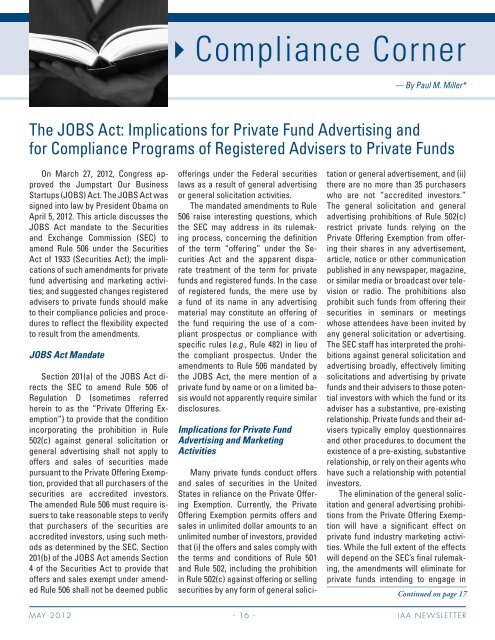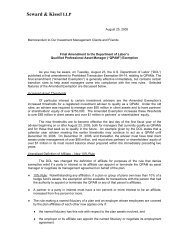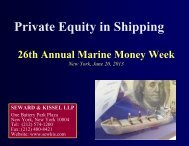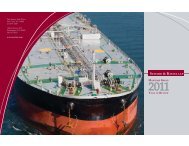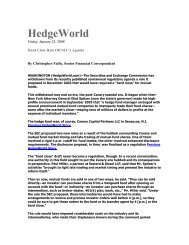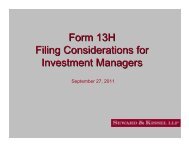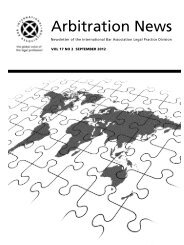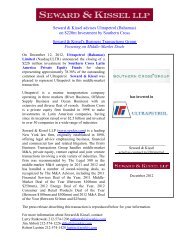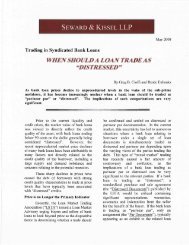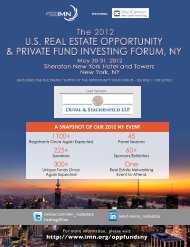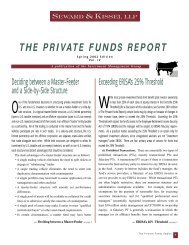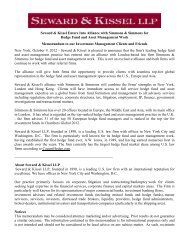Compliance Corner - Seward and Kissel
Compliance Corner - Seward and Kissel
Compliance Corner - Seward and Kissel
Create successful ePaper yourself
Turn your PDF publications into a flip-book with our unique Google optimized e-Paper software.
} <strong>Compliance</strong> <strong>Corner</strong><br />
— By Paul M. Miller*<br />
The JOBS Act: Implications for Private Fund Advertising <strong>and</strong><br />
for <strong>Compliance</strong> Programs of Registered Advisers to Private Funds<br />
On March 27, 2012, Congress approved<br />
the Jumpstart Our Business<br />
Startups (JOBS) Act. The JOBS Act was<br />
signed into law by President Obama on<br />
April 5, 2012. This article discusses the<br />
JOBS Act m<strong>and</strong>ate to the Securities<br />
<strong>and</strong> Exchange Commission (SEC) to<br />
amend Rule 506 under the Securities<br />
Act of 1933 (Securities Act); the implications<br />
of such amendments for private<br />
fund advertising <strong>and</strong> marketing activities;<br />
<strong>and</strong> suggested changes registered<br />
advisers to private funds should make<br />
to their compliance policies <strong>and</strong> procedures<br />
to reflect the flexibility expected<br />
to result from the amendments.<br />
JOBS Act M<strong>and</strong>ate<br />
Section 201(a) of the JOBS Act directs<br />
the SEC to amend Rule 506 of<br />
Regulation D (sometimes referred<br />
herein to as the “Private Offering Exemption”)<br />
to provide that the condition<br />
incorporating the prohibition in Rule<br />
502(c) against general solicitation or<br />
general advertising shall not apply to<br />
offers <strong>and</strong> sales of securities made<br />
pursuant to the Private Offering Exemption,<br />
provided that all purchasers of the<br />
securities are accredited investors.<br />
The amended Rule 506 must require issuers<br />
to take reasonable steps to verify<br />
that purchasers of the securities are<br />
accredited investors, using such methods<br />
as determined by the SEC. Section<br />
201(b) of the JOBS Act amends Section<br />
4 of the Securities Act to provide that<br />
offers <strong>and</strong> sales exempt under amended<br />
Rule 506 shall not be deemed public<br />
offerings under the Federal securities<br />
laws as a result of general advertising<br />
or general solicitation activities.<br />
The m<strong>and</strong>ated amendments to Rule<br />
506 raise interesting questions, which<br />
the SEC may address in its rulemaking<br />
process, concerning the definition<br />
of the term “offering” under the Securities<br />
Act <strong>and</strong> the apparent disparate<br />
treatment of the term for private<br />
funds <strong>and</strong> registered funds. In the case<br />
of registered funds, the mere use by<br />
a fund of its name in any advertising<br />
material may constitute an offering of<br />
the fund requiring the use of a compliant<br />
prospectus or compliance with<br />
specific rules (e.g., Rule 482) in lieu of<br />
the compliant prospectus. Under the<br />
amendments to Rule 506 m<strong>and</strong>ated by<br />
the JOBS Act, the mere mention of a<br />
private fund by name or on a limited basis<br />
would not apparently require similar<br />
disclosures.<br />
Implications for Private Fund<br />
Advertising <strong>and</strong> Marketing<br />
Activities<br />
Many private funds conduct offers<br />
<strong>and</strong> sales of securities in the United<br />
States in reliance on the Private Offering<br />
Exemption. Currently, the Private<br />
Offering Exemption permits offers <strong>and</strong><br />
sales in unlimited dollar amounts to an<br />
unlimited number of investors, provided<br />
that (i) the offers <strong>and</strong> sales comply with<br />
the terms <strong>and</strong> conditions of Rule 501<br />
<strong>and</strong> Rule 502, including the prohibition<br />
in Rule 502(c) against offering or selling<br />
securities by any form of general solicitation<br />
or general advertisement, <strong>and</strong> (ii)<br />
there are no more than 35 purchasers<br />
who are not “accredited investors.”<br />
The general solicitation <strong>and</strong> general<br />
advertising prohibitions of Rule 502(c)<br />
restrict private funds relying on the<br />
Private Offering Exemption from offering<br />
their shares in any advertisement,<br />
article, notice or other communication<br />
published in any newspaper, magazine,<br />
or similar media or broadcast over television<br />
or radio. The prohibitions also<br />
prohibit such funds from offering their<br />
securities in seminars or meetings<br />
whose attendees have been invited by<br />
any general solicitation or advertising.<br />
The SEC staff has interpreted the prohibitions<br />
against general solicitation <strong>and</strong><br />
advertising broadly, effectively limiting<br />
solicitations <strong>and</strong> advertising by private<br />
funds <strong>and</strong> their advisers to those potential<br />
investors with which the fund or its<br />
adviser has a substantive, pre-existing<br />
relationship. Private funds <strong>and</strong> their advisers<br />
typically employ questionnaires<br />
<strong>and</strong> other procedures to document the<br />
existence of a pre-existing, substantive<br />
relationship, or rely on their agents who<br />
have such a relationship with potential<br />
investors.<br />
The elimination of the general solicitation<br />
<strong>and</strong> general advertising prohibitions<br />
from the Private Offering Exemption<br />
will have a significant effect on<br />
private fund industry marketing activities.<br />
While the full extent of the effects<br />
will depend on the SEC’s final rulemaking,<br />
the amendments will eliminate for<br />
private funds intending to engage in<br />
Continued on page 17<br />
M AY 2 0 1 2<br />
- 1 6 -<br />
I A A N E W S L E T T E R
continued from page 16<br />
general advertising the requirement to<br />
establish <strong>and</strong> document a substantive,<br />
pre-existing relationship with potential<br />
investors. This change should permit<br />
private funds to advertise in periodicals,<br />
newsletters <strong>and</strong> other publications with<br />
public distribution, sponsor events or<br />
seminars accessible to the public, set<br />
up publicly accessible websites <strong>and</strong><br />
conduct other forms of general advertising.<br />
The change should also permit<br />
portfolio managers of private funds to<br />
have more flexibility in discussing the<br />
funds in interviews with the press, at<br />
conferences <strong>and</strong> in other public forums.<br />
Finally, the change should permit<br />
private funds to conduct general solicitations<br />
of potential investors, including<br />
solicitations through social media.<br />
Changes to Registered Adviser<br />
<strong>Compliance</strong> Programs<br />
Registered advisers to private funds<br />
often incorporate into their compliance<br />
programs the private placement offering<br />
requirements, <strong>and</strong> these requirements<br />
are often the focus of the SEC<br />
staff during an examination of a registered<br />
adviser. During an examination,<br />
the SEC staff seeks information about<br />
the exemptions under the Securities<br />
Act upon which each private fund relies<br />
<strong>and</strong> the names of current investors <strong>and</strong><br />
investors who previously purchased<br />
<strong>and</strong> redeemed securities of the private<br />
funds. The SEC staff also seeks copies<br />
of the offering memor<strong>and</strong>um <strong>and</strong> subscription<br />
agreement for each fund <strong>and</strong>,<br />
in the area of advertising, information<br />
about the registered adviser’s website,<br />
including sections of the site that are<br />
accessible only with a username <strong>and</strong><br />
password.<br />
As noted above, the amendments<br />
to the Private Offering Exemption will<br />
eliminate the requirement that private<br />
funds intending to engage in general<br />
advertising establish <strong>and</strong> document a<br />
substantive, pre-existing relationship<br />
with potential investors. Consequently,<br />
the compliance procedures <strong>and</strong> questionnaires<br />
used by these funds <strong>and</strong> their<br />
advisers to document the existence of<br />
the substantive, pre-existing relationship<br />
with potential investors may be<br />
modified substantially or, depending on<br />
the SEC’s rulemaking in connection with<br />
the amendments, eliminated. Registered<br />
advisers to these funds may, nonetheless,<br />
determine to maintain certain of<br />
the procedures or aspects of current<br />
questionnaires going forward for compliance<br />
control or other purposes.<br />
Anti-Fraud <strong>and</strong> Advertising Issues.<br />
While amended Rule 506 will likely permit<br />
private funds <strong>and</strong> their advisers to<br />
modify substantially or eliminate the procedures<br />
<strong>and</strong> questionnaires addressing<br />
when <strong>and</strong> to whom a private fund may<br />
advertise or make solicitations, the<br />
amended rule will not alter the content<br />
requirements applicable to private fund<br />
advertisements <strong>and</strong> solicitations. The<br />
anti-fraud provisions of the federal securities<br />
laws, including those under the<br />
Investment Advisers Act of 1940, will<br />
continue to govern the content of such<br />
advertisements <strong>and</strong> solicitations. These<br />
provisions generally provide that it is<br />
unlawful to make any untrue statement<br />
of material fact or to omit to state a material<br />
fact necessary to make the statements<br />
made, in light of the circumstances<br />
under which they were made, not<br />
misleading to an investor or prospective<br />
investor in a private fund.<br />
Like the anti-fraud requirements,<br />
the advertising requirements under the<br />
Advisers Act will continue to apply to<br />
advertising <strong>and</strong> marketing materials<br />
of private funds for which a registered<br />
adviser serves as adviser. These advertising<br />
requirements prohibit advertisements<br />
that, among other things, contain<br />
(i) testimonials about the adviser’s<br />
services, (ii) past specific profitable<br />
recommendations of the adviser, or (iii)<br />
any untrue statement of material fact,<br />
or which is otherwise false or misleading.<br />
These requirements also impose<br />
restrictions on presenting performance<br />
information.<br />
COMPLIANCE CORNER<br />
In light of the foregoing content requirements,<br />
the new, permitted audience<br />
for private fund information <strong>and</strong><br />
the SEC staff’s focus on this area during<br />
examinations, the marketing <strong>and</strong><br />
advertising materials of a private fund<br />
should include disclosures alerting potential<br />
investors that securities of the<br />
private fund may only be purchased<br />
by investors who are accredited investors.<br />
In addition, registered adviser<br />
compliance programs should continue<br />
to require the review of advertising <strong>and</strong><br />
marketing materials of private funds for<br />
purposes of compliance with the antifraud<br />
provisions <strong>and</strong> the advertising requirements<br />
under the Advisers Act. The<br />
compliance program should also incorporate<br />
guidance for portfolio managers<br />
<strong>and</strong> other fund personnel conducting<br />
public interviews.<br />
Documents <strong>and</strong> Procedures Supporting<br />
Reasonable Belief. Although<br />
private placements of securities conducted<br />
in reliance on the Private Offering<br />
Exemption currently are limited primarily<br />
to accredited investors, the SEC<br />
may provide additional guidance concerning<br />
the methods for establishing<br />
a reasonable belief that each investor<br />
in a fund relying on amended Rule 506<br />
is an accredited investor, particularly<br />
in light of the JOBS Act m<strong>and</strong>ate that<br />
all purchasers be accredited investors.<br />
The SEC may provide, for example, a list<br />
of non-exclusive methods for establishing<br />
a reasonable belief for this purpose.<br />
Such a list could include a requirement<br />
for a fund to obtain specific documentation<br />
of an investor’s net worth <strong>and</strong><br />
income. Private funds currently satisfy<br />
the accredited investor st<strong>and</strong>ard by requiring<br />
each investor, in the subscription<br />
agreement with the fund, to provide<br />
a representation to the fund that<br />
the investor meets one or more of the<br />
criteria of an accredited investor <strong>and</strong><br />
by concluding that it is reasonable for<br />
the fund to rely on that representation.<br />
Amended Rule 506 will in effect<br />
Continued on page 18<br />
I A A N E W S L E T T E R - 1 7 -<br />
M AY 2 0 1 2
COMPLIANCE CORNER continued from page 17<br />
eliminate the availability of the 35 nonaccredited<br />
investor condition of the<br />
Rule for private funds that intend to<br />
engage in general advertising or solicitation.<br />
This change will likely have<br />
greater implications for Section 3(c)(1)<br />
private funds (including those funds accepting,<br />
under the current rule, investments<br />
from knowledgeable employees<br />
who are not accredited investors) than<br />
for Section 3(c)(7) private funds whose<br />
investors must be qualified purchasers<br />
under applicable requirements of<br />
the Investment Company Act of 1940.<br />
This change will also likely place added<br />
weight on the documentation <strong>and</strong> procedures<br />
used to support the reasonable<br />
belief that all purchasers of the fund’s<br />
securities are accredited investors.<br />
Conclusion<br />
The amendments to the Private Offering<br />
Exemption m<strong>and</strong>ated by the JOBS<br />
Act create new opportunities for private<br />
funds <strong>and</strong> their advisers to market<br />
private fund securities to potential investors<br />
- some would argue permitting<br />
activities that may be occurring in the<br />
industry today. These new opportunities<br />
should not, however, be undertaken<br />
without due consideration for the continuing<br />
obligations of funds <strong>and</strong> their advisers<br />
under the federal securities laws.<br />
*Paul M. Miller is a partner in the<br />
Washington DC office of <strong>Seward</strong> & <strong>Kissel</strong><br />
LLP. He can be reached by email at<br />
millerp@sewkis.com. This article is intended<br />
to provide general information<br />
on the matters discussed. It should not<br />
be relied upon for legal advice on any<br />
matter. Readers<br />
should seek specific<br />
legal advice<br />
before acting with<br />
regard to the subjects<br />
mentioned<br />
herein. •<br />
Paul M. Miller, partner,<br />
<strong>Seward</strong> & <strong>Kissel</strong> LLP<br />
House Committee Set to Act on Chairman’s Investment Adviser SRO Bill—continued from front cover<br />
fund companies as well as hedge fund<br />
<strong>and</strong> private equity advisory firms.”<br />
Unlike the previously-circulated<br />
discussion draft, the bill that Bachus<br />
is expected to introduce is likely to<br />
limit SRO coverage of state-registered<br />
advisers <strong>and</strong> to include a requirement<br />
that the SRO (referred to as a “national<br />
investment adviser association”)<br />
perform a cost-benefit analysis as part<br />
of any rulemaking. There could also be<br />
changes to the exemptions.<br />
If Chairman Bachus brings up the bill<br />
for a vote, he is likely to obtain majority<br />
support from the Republican members<br />
of the Financial Services Committee.<br />
Further action by the full House could<br />
follow at a later date.<br />
Bachus is introducing the legislation<br />
in response to the SEC’s January 19,<br />
2011 report to Congress m<strong>and</strong>ated<br />
under Section 914 of the Dodd-Frank<br />
Act. That report recommended that<br />
Congress consider three options to<br />
enhance the frequency of examinations<br />
of registered investment advisers: (1)<br />
authorize the SEC to impose user fees<br />
to fund examinations, (2) authorize the<br />
SEC to designate one or more SROs<br />
to examine advisers, or (3) authorize<br />
FINRA to examine firms dually<br />
registered as both broker-dealers <strong>and</strong><br />
advisers.<br />
The IAA is strongly opposed to<br />
investment adviser oversight by a<br />
private, quasi-governmental regulator<br />
<strong>and</strong> is committed to maintaining the<br />
SEC as advisers’ sole regulator. In order<br />
to bolster the SEC’s resources without<br />
further burdening U.S. taxpayers, the<br />
IAA believes that Congress should—in<br />
lieu of an SRO—consider authorizing<br />
the SEC to assess fairly apportioned<br />
user fees on advisory firms that would<br />
be dedicated to providing an enhanced<br />
level of examinations by the SEC.<br />
Given the the extraordinary<br />
regulatory burdens <strong>and</strong> costs that this<br />
legislation would impose on advisers,<br />
the IAA is strongly encouraging<br />
advisers to visit IAA’s web site in order<br />
to contact their elected representatives<br />
in Congress <strong>and</strong> voice their strong<br />
opposition to the Bachus investment<br />
adviser SRO bill. Additionally, advisers<br />
should plan to come to Washington,<br />
DC on June 7 to participate in IAA’s 5th<br />
Annual Lobbying Day on Capitol Hill. •<br />
FATCA Update for Advisers with Foreign Funds—continued from page 8<br />
the IRS (<strong>and</strong> did not qualify for an exemption),<br />
any U.S.-source payment to<br />
the FFI would be subject to 30% withholding.<br />
Under this regime, even assets<br />
sold at a loss could be subject to FATCA<br />
withholding on the sale proceeds. With-<br />
holding would be phased in, starting in<br />
2014 for interest, dividends, <strong>and</strong> similar<br />
payments, <strong>and</strong> in 2015 for the gross proceeds<br />
from the disposition of assets.<br />
The proposed FATCA regulations are<br />
available at: http://www.irs.gov/pub/<br />
newsroom/reg-121647-10.pdf. Please<br />
contact IAA Associate General Counsel<br />
Kathy D. Irel<strong>and</strong> at (202) 293-4222 or<br />
kathy.irel<strong>and</strong>@investmentadviser.org<br />
with any questions. •<br />
M AY 2 0 1 2<br />
- 1 8 -<br />
I A A N E W S L E T T E R


